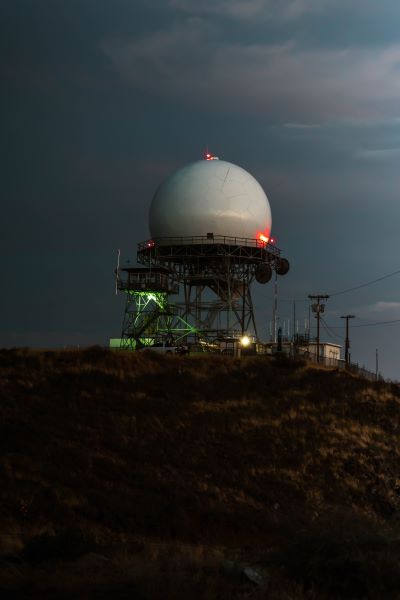Trump’s scrapping of clean energy incentives and climate policies will slow but not stop green energy transition
The Trump administration’s rollback of clean energy incentives and climate policies in the U.S. will slow but not stop the green energy transition, say climate and energy experts.
A global shift to decarbonization will continue, especially as renewable energy technologies continue to get cheaper and China ramps up these technologies at home and in developing countries, they said during an Energy vs. Climate podcast
 “There are all kinds of ways in which decarbonization makes domestic sense for countries around the world already, ways that make economic sense to continue deploying these technologies,” said Jesse Jenkins (photo at right), assistant professor in the Department of Mechanical and Aerospace Engineering and the Andlinger Center for Energy and the Environment at Princeton University.
“There are all kinds of ways in which decarbonization makes domestic sense for countries around the world already, ways that make economic sense to continue deploying these technologies,” said Jesse Jenkins (photo at right), assistant professor in the Department of Mechanical and Aerospace Engineering and the Andlinger Center for Energy and the Environment at Princeton University.
“There are new trade arrangements and new deployment, diplomatic arrangements and other [mechanisms] that can be made to continue making international progress, even if the U.S. is absent,” he said.
Jenkins also expects to see pushback from Republican states – including people who voted for Trump – about losing clean energy tax credits and other incentives that are boosting manufacturing, jobs and other benefits in these states.
For example, the U.S. offers generous tax credits for carbon capture and storage projects and an advanced manufacturing tax credit for wind and solar energy projects, battery energy storage and critical mineral supply chains.
These incentives “are least likely to be repealed because they have the strongest base of support amongst Republican and Republican-aligned constituencies,” Jenkins said.
Nevertheless, last week the U.S. Environmental Protection Agency (EPA) terminated grant agreements worth $20 billion issued by the Biden administration to finance clean energy and climate-friendly projects.
Jenkins said he thinks the tax credit that’s most vulnerable to be scrapped under Trump is the $7,500 for individuals and businesses to purchase light-duty electric vehicles and up to $40,000 for heavy-duty EVs. Eliminating this tax credit would require an act of Congress.
One of Trump’s first acts in office was to revoke Biden’s 50-percent EV target and Trump wants to make less stringent vehicle-emission standards set by the Environmental Protection Agency and fuel economy standards from the National Highway Traffic Safety Administration.
Jenkins said Trump’s decision to freeze all spending on clean energy programs supported by incentives under the Inflation Reduction Act enacted by the Biden administration is unprecedented and scary. “It calls into fundamental question the faith and credit of the federal government. If you sign a contract with the government, you should expect the U.S. government to follow through on that contract.”
He believes there would need to be a “huge amount of unanimity” in Congress, where Republicans have a razor-thin majority, to unwind tax credits and other clean energy incentives.
Trump is also in some cases taking actions “that aren’t legal, that are in fact extralegal,” Jenkins said. “They’re pushing authority and the courts are steadily coming in and saying, ‘No, you can’t do that.’”
The Trump administration’s firing of hundreds of thousands of federal employees also is going to affect Americans, especially with U.S. mid-term elections next year, as well as corporate investment decisions in the U.S., he said.
“Those are real families and real people in communities all over the country, not just in Washington, D. C.” Jenkins said. They’re going to be looking for jobs. They're not going to have money to spend.”
Polling shows 60 percent of Americans don’t like what’s going on and it’s starting to look like a political liability for congressional Republicans, he said. “There is a political cost to all of this. You can’t cause this much damage to people’s lives without [having] any consequences.”
Jenkins leads the Princeton Zero Lab, where his research focuses on improving and applying optimization-based energy system models to evaluate low-carbon energy technologies, policy options and robust decisions under deep uncertainty.
The broader anxiety and uncertainty caused by the Trump administration’s “capricious decision making” will impact business investment and hiring, consumer sentiment and spending and any kind of discretionary spending, Jenkins said. “That is going to lock up a good chunk of the economy.”
Indiscriminate firing of federal employees is “shocking”
.png) The Trump administration will certainly slow down the energy transition, “but I don’t think it’s going to dramatically change the arc of what’s happening globally on decarbonization,” said David Keith (photo at right), professor and founding faculty director of the Climate Systems Engineering Initiative at the University of Chicago.
The Trump administration will certainly slow down the energy transition, “but I don’t think it’s going to dramatically change the arc of what’s happening globally on decarbonization,” said David Keith (photo at right), professor and founding faculty director of the Climate Systems Engineering Initiative at the University of Chicago.
Although Trump is set to be in power for four years and the U.S. is responsible for about one-quarter of the world’s greenhouse gas emissions, what actually matters in responding to climate change is global emissions over historical time, Keith said.
“If you think about say the progress of electric vehicles, I think there's no version of the world now where electric vehicles don't take over most of light-duty transportation,” he said.
Keith, who’s a Canadian, said he’s much more concerned about the state of geopolitics, the Trump tariffs and how the U.S. has gone in just a few weeks from being a trusted ally and partner of Canada to being seen as untrustworthy and an adversary.
Keith said he’s also shocked at the Trump administration’s indiscriminate firing of federal employees. He said he was recently in a meeting at the National Oceanic Atmospheric Administration’s laboratory in Boulder, Colorado, when a young talented scientist got his termination notice.
“That was really pretty shocking. Just to state the obvious, it’s just dumb by any measure.”
If the Trump administration actually wanted to make federal agencies more efficient and cut costs, it should be targeting highly paid, senior employees rather than up-and-coming smart scientists who receive comparatively low salaries, Keith said. “There’s no version of [what the Trump administration] is doing that makes sense as cost cutting.”
The Trump administration also is purging words like “clean energy,” “climate crisis,” “climate science,” “environmental quality” and “pollution” – along with hundreds of other words – from federal agencies, programs and documents, according to a story by The New York Times.
The presence of some terms was used to automatically flag for review some grant proposals and contracts that could conflict with Trump’s executive orders, the story said.
 Podcast host Ed Whittingham (photo at right), a clean energy policy/finance professional and former executive director of the Pembina Institute, a national clean energy think tank, said he has been meeting with Canadian officials about the G7 meeting scheduled June 15 to 17 in Kananaskis Country, Alberta.
Podcast host Ed Whittingham (photo at right), a clean energy policy/finance professional and former executive director of the Pembina Institute, a national clean energy think tank, said he has been meeting with Canadian officials about the G7 meeting scheduled June 15 to 17 in Kananaskis Country, Alberta.
The Trump administration is asking that the word “climate” be deleted from anything to do with G7 planning and the word “clean” be removed, with the exception of “clean coal,” he said. “It sounds like the U.S. is interested in pushing the clean coal agenda.”
With the increasing pushback on Trump’s actions, Whittingham asked Jenkins whether there was any possibility of getting bipartisan agreement on replacement measures for any clean energy incentives and programs scrapped by Trump, before Congress recesses for the summer.
Given the polarization in Congress, “I have a hard time seeing Democrats and Republicans coming together to do any sort of proactive, productive policymaking policymaking in the next six months,” Jenkins said.
“I think we just have to survive the next six to 18 months and see where we’re at.”
China poised to be a key player in green energy transition
Jenkins, Keith and Whittingham all agreed that China will be a key player, especially in the absence of the U.S., in keeping the energy transition going and deploying renewable energy.
Keith pointed out that China exports surprisingly small amounts of renewable energy equipment and other components to the U.S., with much of these exports going to the developing world.
“That means China has a kind of fundamental interest in driving decarbonization in the developing world,” he said.
Jenkins agreed, saying: “China is now positioning itself as the first global clean tech hegemon.”
China is building part of its economy on developing and deploying clean energy trade technologies both at home and in developing countries, and this will only increase in the face of trade barriers, he said.
“If that's what makes clean energy cheap and accelerates decarbonization around the world, then that is the most important climate trend in the world right now, probably far more important than what's happening in the U. S.,” Jenkins said.
In 2020, for example, China pledged to reach 1,200 gigawatts of renewables capacity by 2030, more than double its capacity at that time. At its present pace, it will meet that target by 2025 and could boast as much as 1,000 gigawatts of solar power alone by the end of 2026, according to an article in Yale Environment 360.
This achievement would make a substantial contribution to the 11,000 gigawatts of installed renewable capacity that the world needs to meet the 2030 targets of the Paris Agreement on climate, the article said.
Fossil fuels now make up less than half of China’s total installed power generation capacity, a dramatic reduction from a decade ago when fossil fuels accounted for two-thirds of its power capacity.
When the International Energy Agency issued its assessment of the pledge to triple renewables globally by 2030, it pointed out that the 50-percent increase in global renewable installations in 2023 was largely driven by China.
In 2022, China installed roughly as much solar photovoltaic capacity as the rest of the world combined, then went on in 2023 to double new solar installations, increase new wind capacity by 66 percent, and almost quadruple additions of energy storage.
China’s National Development and Reform Commission announced earlier this month that the country would be investing in major renewable energy projects – developing new offshore wind farms and large scale clean energy bases that combine solar and wind farms.
China also is expanding its reach and helping to boost green energy adoption in other countries – most notably by shifting its Belt and Road Initiative, a global infrastructure development project, in developing nations to focus on clean energy and green infrastructure.
Jenkins said if the Trump administration, through tariffs and trade barriers, makes it harder for Chinese-owned companies to set up in countries not subject to these barriers, the renewable energy products imported by the U.S. from its trade partners will become more expensive. “It could make it much more difficult to keep up with demand growth in the electricity sector.”
Potential upside of Trump’s actions is policy changes in Canada
The near-term impact of even a 10-percent U.S. tariff on Canadian oil imports will increase gasoline prices in Michigan, Wisconsin, Ohio and other states that voted for Trump, “and that’s going to hurt,” Jenkins said.
Within the U.S., Trump’s freeze on IRA spending has created uncertainty among companies expecting to receive payments for carbon capture and storage (CCS) projects, he said.
Global oil giant Occidental, which is building a CCS project in Texas based on direct air capture technology that Keith developed through Carbon Engineering, a Canadian company he founded and sold to Occidental, is actively lobbying the Trump administration to ensure those payments keep flowing, Jenkins said.
Likewise, hydrogen hubs in the U.S. are anxiously awaiting IRA money for projects. About $6 billion in funding and U.S. Department of Energy loans were committed by the Biden administration for a wide range of industrial decarbonization projects, including demonstration projects.
“If this [uncertainty] continues on for months and months, I think many of those projects will start to get cancelled just because they can’t defer forever,” Jenkins said.
When it comes to the response by Canada’s energy sector to the Trump tariffs, building more east-west electricity transmission lines, including integrating British Columbia’s hydroelectric power with Alberta’s and Saskatchewan’s wind and solar energy, makes “huge sense,” Keith said.
“This is the one potential upside of this Trump insanity, is that it is going to shake some policy loose that should happen anyway,” he said.
Canada has been talking forever about interprovincial trade barriers “and how they’re inefficient and stupid,” Keith said. “And they may actually now all come down and pretty fast.”
Jenkins noted that Trump ran for a second term “on lowering costs for people. He ran on the cost of eggs. He ran on the cost of energy and how he was supposedly going to fix [things]. He’s done basically the exact opposite.”
R$
Events For Leaders in
Science, Tech, Innovation, and Policy
Discuss and learn from those in the know at our virtual and in-person events.
See Upcoming Events
You have 1 free article remaining.
Don't miss out - start your free trial today.
Start your FREE trial Already a member? Log in
By using this website, you agree to our use of cookies. We use cookies to provide you with a great experience and to help our website run effectively in accordance with our Privacy Policy and Terms of Service.





